Marijuana, abortion and radical reforms - the legacy of the "last beggar" of the president of the world
Categories: Society
By Pictolic https://pictolic.com/article/marijuana-abortion-and-radical-reforms-the-legacy-of-the-last-beggar-of-the-president-of-the-world.htmlA presidential campaign has started in Uruguay: at the end of October, the inhabitants of the country will elect a new head of state. The struggle between the candidates is serious, but the whole world is much more interested in the legacy of the outgoing leader, José Mujica, who built "the most liberal country in Latin America."
(Total 9 photos)
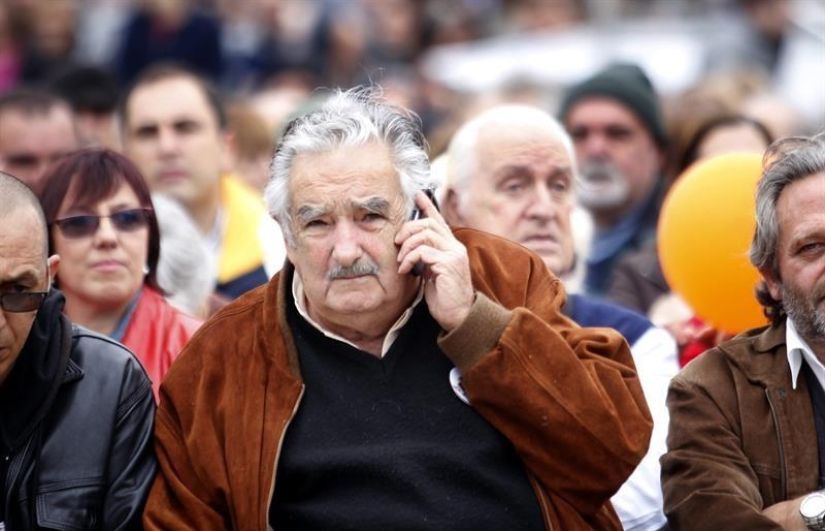 Source: nvua.net
Source: nvua.net
José Mujica became famous throughout the world for his incredible altruism and radical reforms. In 2013, the influential magazine The Economist named Uruguay "Country of the Year". Moreover, this Latin American state was the first to receive such an honor, before the magazine called only “people of the year”. The editors explained their choice simply: from a conservative Catholic country, it rapidly turned into a real stronghold of social liberalism.

1. President of Uruguay Jose Mujica despises life, comfort and convenience
In just a few years, same-sex marriage, marijuana and abortion were legalized there. The leading role in these transformations was played by José Mujica, the president of the leftist persuasion, whose lifestyle earned respect even from the right-wing British newspaper The Daily Mail, which loves to expose "fighters for the people's happiness" living beyond their means. An article about the Uruguayan president was titled “Finally! A politician who does NOT hide his property!
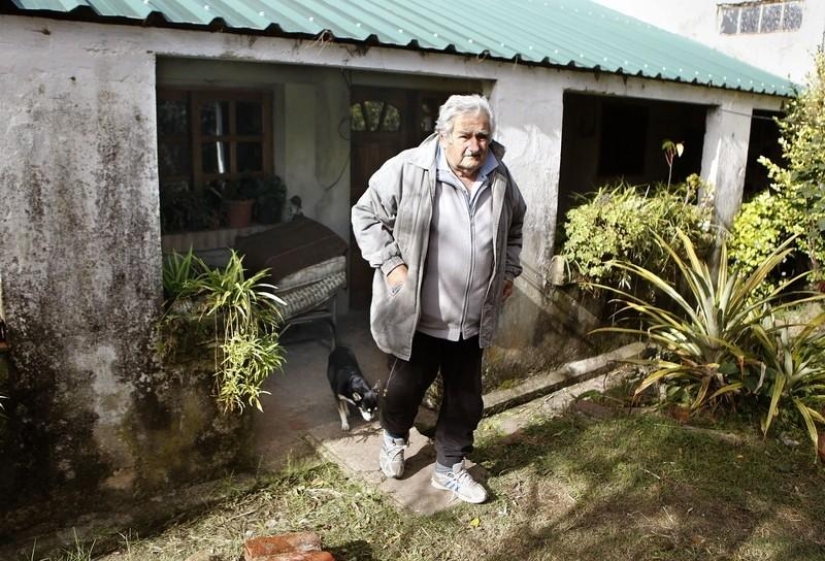
2. President of Uruguay Jose Mujica at the door of his "residence"
Mujica really has nothing to hide. After becoming president, he abandoned the luxurious palace in which numerous Uruguayan caudillos had previously lived, and settled on his wife's farm in the vicinity of the capital, Montevideo. It is not easy to guess that the president lives in a modest one-bedroom house: his car, a 1987 Volkswagen Beetle, is parked in front of the house surrounded by chrysanthemums. Security is represented by two police officers, bored on the side of the country road leading to the farm, as well as the three-legged Manuela, the head of state's favorite dog.
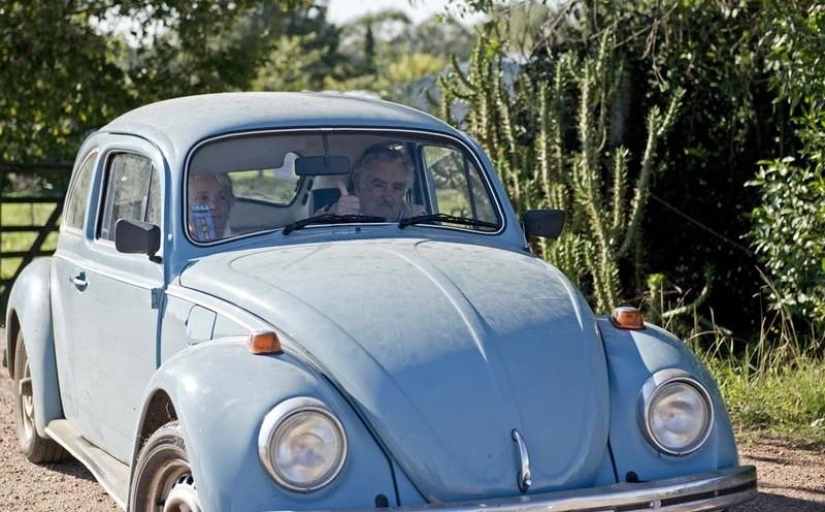
3. Presidential procession - Mujica driving his car. Photo: www.miamiherald.com
The 78-year-old president himself in his spare time is mainly engaged in a small garden. When age makes itself felt, he goes to an ordinary rural clinic, where he patiently waits for his turn to see a doctor along with ordinary visitors. He also buys food at a regular store, where he drives his own car after work. At the same time, he spends very little money: he gives 90% of the presidential salary to charity, and he himself lives on about a thousand dollars a month.
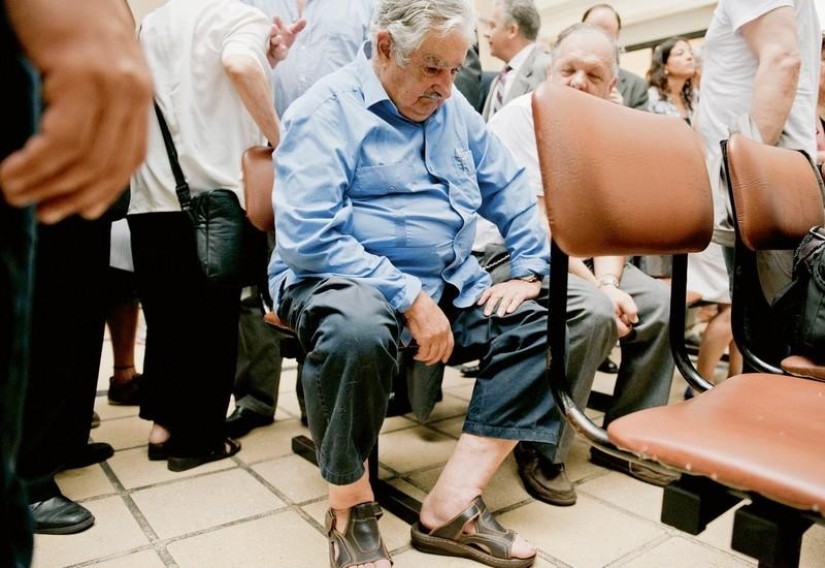
4. José Mujica is waiting in line to see a doctor in a rural clinic. Photo: hzm_umr/Twitter
Mujica really doesn't like being called "the poorest president on the planet." According to him, it is precisely those who surround themselves with incredible luxury that hides a complete spiritual and moral emptiness are poor. And he just lives normally, in full accordance with his own needs. The President explains that for many years the ultimate dream was an ordinary mattress, so the current life suits him perfectly.

5. The president is busy with the housework
Mujica knows what he is talking about: he began his political career in the Marxist guerrilla movement Tupamaros. His fighters were known as a kind of "Robinhoods" - they robbed the rich and banks, after which they distributed money and property to the poor. Such expropriations were often accompanied by violence: Mujica, for example, was wounded six times in skirmishes. When the military came to power, most of the members of Tupamaros, including the future president, ended up behind bars. In prison, he spent a decade and a half, and two years - alone at the bottom of the well, where the conditions, of course, were very cramped: the mattress was not supposed.
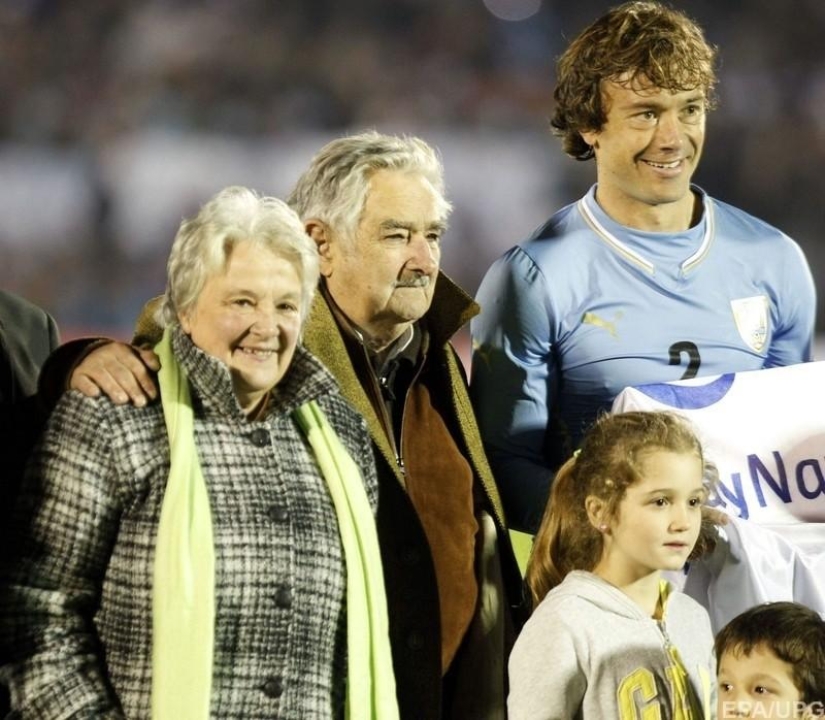
6. Mujica with the first lady
The Uruguayan president, although he calls on the whole world to get out of the fetters of "immoderate consumption", does not require any asceticism from fellow citizens. According to him, people have always strived and will always strive to live better, which, in general, is normal.
Therefore, Mujica abandoned the Marxist views of his youth and pursued a moderate center-left economic policy that has provided his country with a stable three percent growth over the past years. The state invests heavily in nationwide and infrastructure projects. For example, at the initiative of the president, every student in the country is provided with an inexpensive computer for free.
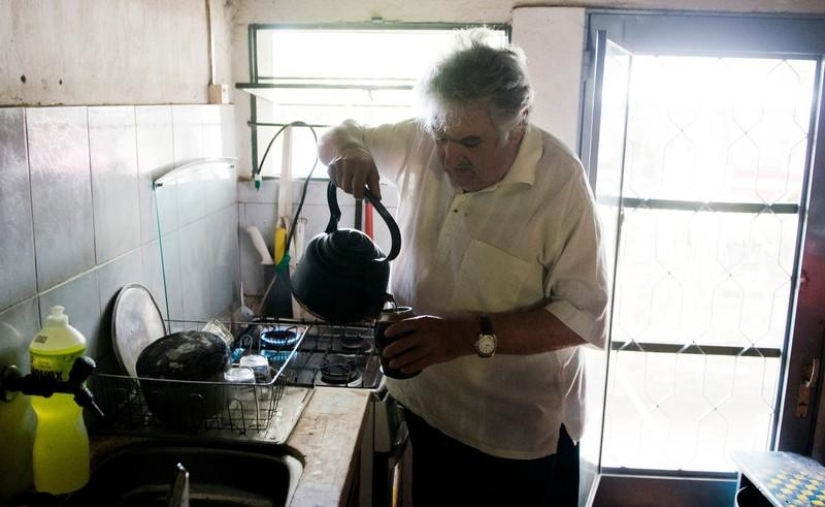
7. The President is making tea. Photo: ranaseten/Twitter
Under Mujica's leadership, Uruguay became a much less dangerous country. After the full legalization of marijuana and the establishment of strict state control over its circulation, transnational drug cartels began to leave the country. Marijuana became widely available, after which the popularity of heroin and cocaine declined sharply. There was no need for any wars against the drug business: Uruguay simply ceased to be a profitable place for its development.
By the way, the population, which at first perceived the legalization of marijuana with a fair amount of skepticism (the president's rating then crept down), soon realized all the positive aspects of the innovation. Now no one even raises the issue of restoring criminal liability for the possession and consumption of "weed". Moreover, all over the world, the experience of Uruguay in this area is actively studied and set as an example.
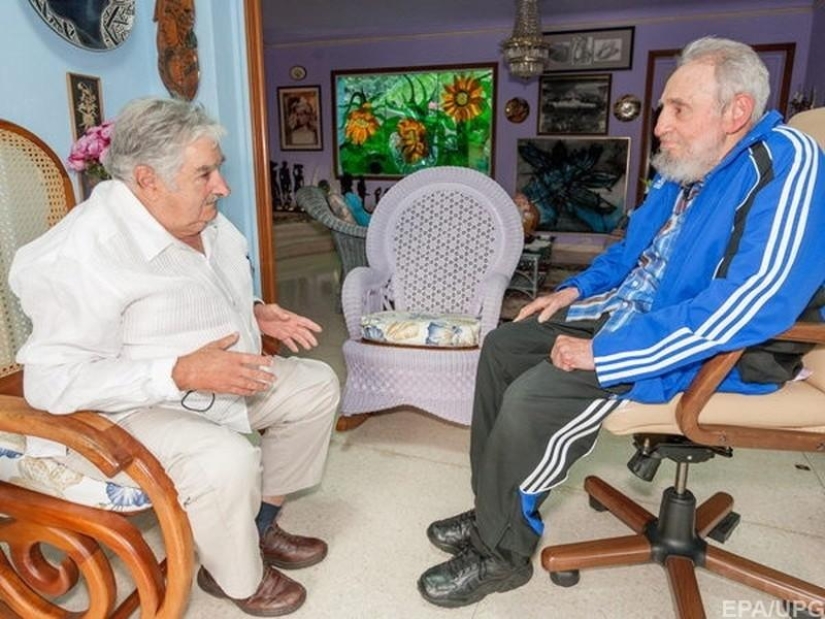
8. Two commandantes: Mujica visiting Fidel Castro
After October, the people of the country will miss not only the president's altruism and readiness for reforms. Many Uruguayans are impressed by his manner of dialogue: frank and even harsh. Six bullet wounds, a decade and a half in prison and a respectable age can add grumpiness and quarrelsomeness to anyone. Of course, the presidential status imposes certain restrictions, but Mujica still remains a partisan at heart. In 2013, after negotiations with Argentine President Cristina Kirchner, the Uruguayan leader, believing that no one was listening, called his colleague an "old witch." However, the microphone was turned on, so this definition was not only heard, but also instantly spread across social networks. Since then, the Argentine opposition Kirchner has not been called otherwise. Mujica's apologies were little consolation to her in that sense.
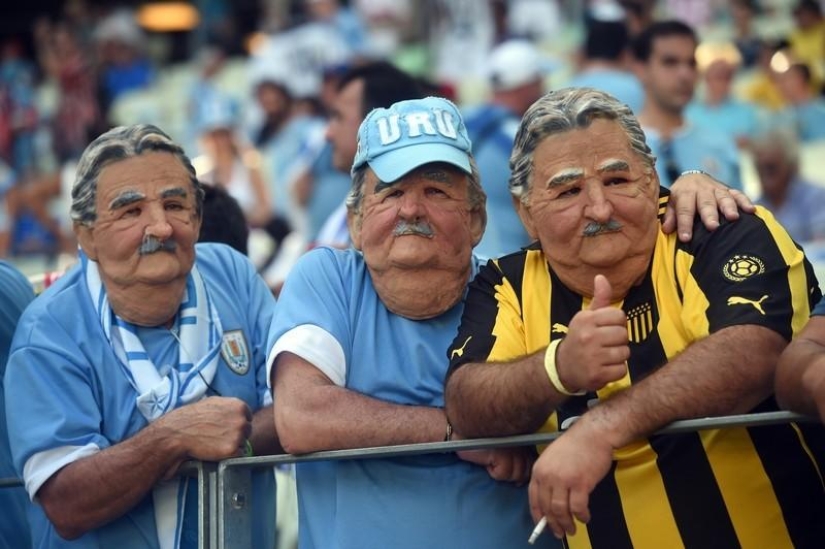
9. Uruguayans love their president very much. In the photo - one of the manifestations of this love: Uruguayan fans at the 2014 World Cup in Brazil
Another episode from the same series occurred quite recently. The Uruguayan president, having learned about the disqualification of the striker of the national team Luis Suarez in the midst of the World Cup, declared FIFA functionaries "old m ... kami." He called the decision to disqualify him "fascist". When journalists asked if he could be quoted, the head of state replied: “Yes, please! Post it." Needless to say, his popularity among fellow citizens skyrocketed after that. The defeat of the Uruguayan team by the Colombians only strengthened the voters in the correctness of the words of their president.
Now in Uruguay, the election campaign is in full swing, in which Mujica does not participate. However, he will no doubt remain the legendary head of state who, as The Economist noted, “tipped the balance from individual to collective, from gloom to joy.”
Recent articles

It's high time to admit that this whole hipster idea has gone too far. The concept has become so popular that even restaurants have ...

There is a perception that people only use 10% of their brain potential. But the heroes of our review, apparently, found a way to ...
Related articles

Nuclear suitcase President of the United States know everything. But about what it is and how it works, known only to the elite. ...

On August 11, 1984, President Ronald Reagan made a joke during the preparation for the traditional Saturday radio address to ...

Once the African state of Burkina Faso was called Upper Volta and was an overseas territory of France. In the late 50s, Paris gave ...

New Year's is a time to surprise and delight loved ones not only with gifts but also with a unique presentation of the holiday ...